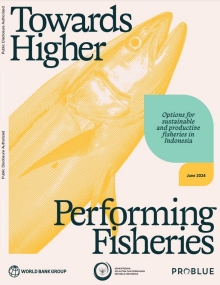Reports

This report examines policy options to support higher-performing fisheries in Indonesia. Drawing on bioeconomic modelling, policy analysis, and insights from stakeholders, the report quantifies the costs and benefits of management enhancements, and considers policy measures that could contribute towards such enhancements.
Climate change is driving the increase in water temperatures, storm severity, sea level rise, and causing shifts in coastal ecosystems and fisheries. These trends pose challenges for Indonesia’s ocean economy and the people it supports. A new collaborative report by the World Bank, the Ministry of Marine Affairs and Fisheries and the University of British Columbia provides knowledge and recommendations on mitigation measures related to the impacts of climate change on fisheries, the economy, and coastal communities in Indonesia. Download the report here.

This report aims to enhance the evidence available to support efforts to improve management, retrieval, and recycling of ALDFG and EOLFG in Indonesia. It assesses ALDFG risk of each specific gear to establish baselines for the elements relevant to managing EOLFG and ALDFG and, in the longer term, to monitor and evaluate the impacts of prevention, mitigation and/or curative actions.

This report presents options for reducing the Abandoned, Lost and Discarded Fishing Gear (ALDFG) and the Abandoned, Lost and Discarded Aquaculture Gear (ALDAG) in Indonesia and improving the management and use of the End-of-life Fishing Gear (EOLFG). The report provides time-bound prioritized actions under six broad categories.

This roadmap describes plastic policy options to support the transition to a full implementation of the plastic ban on certain single-use plastics by 2030.

This study provides the first Indonesia-wide assessment integrating local waste data with actual hydrological conditions to tell the story of how local practices contribute to marine plastic pollution.

A new World Bank report details the status of, and trends, and opportunities towards a blue economy in Indonesia, building on the existing efforts and goals set out by the government. The report argues that the future of these oceanic sectors relies on the health of the natural assets – marine and coastal ecosystems.

This edition of the Indonesia Economic Quarterly report highlights the importance of the maritime economy to Indonesia’s economic development and sustainable growth. When well-managed, the country’s oceans can make a larger contribution to the economy through higher revenues from tourism and fisheries.

The Marine Debris Hotspot Rapid Assessment for Indonesia was conducted by the World Bank at the request of relevant Indonesia government agencies and research institutions, to provide an informed and focused analysis of land-based leakage of solid waste, particularly plastics, to the marine environment. The assessment was a rapid study carried out in two phases, providing up-to-date information from 15 cities in western and central parts of Indonesia.
Factsheet and Infographics
Indonesia Coral Bond - An Innovative Ocean Financing Instrument
The proposed Indonesia Coral Bond is designed to deliver independently verified conservation and biodiversity outcomes in some of the most biodiverse coral reef ecosystems on the planet. The proposed bond leverages an existing US$210 million World Bank operation (the Oceans for Prosperity Project) supporting the Government of Indonesia to increase management effectiveness in marine protected areas
This document covers the key findings of the World Bank’s “Management, Retrieval and Recycling of End-of-Life and Abandoned, Lost and Discarded Fishing Gear (EOLFG and ALDFG)” and the “Options for Reducing Plastic Leakage to the Marine Environment from Capture Fisheries and Aquaculture.” Both reports aim to enhance the evidence available to support efforts to improve management, retrieval, and recycling of ALDFG and EOLFG in Indonesia.
Infographic: Oceans for Prosperity Project (Lautra)
The Lautra project aims to enhance the sustainable management of marine protected areas and coral reef fisheries while improving access to economic opportunities for local communities in Eastern Indonesia.
Infographic: Stemming the Plastics Tide in Indonesia
An overview of World Bank’s approach to support to the Government Indonesia’s goal to free its waterways, coastal areas, and oceans from plastic pollution.
Oceans for Prosperity: Reforms for a Blue Economy in Indonesia
Achieving threefold benefits of a blue economy: healthy oceans, thriving economies, and resilient coastal livelihoods.
Coastal Fisheries Initiative: Indonesia Challenge Fund
Promoting responsible private sector investment for improved sustainability of Indonesia’s fisheries.
Indonesia’s Mangroves for Prosperous Communities and Healthy Planet
Protecting and restoring Indonesia’s mangroves ecosystems help coastal communities, the national economy, and the planet.
Indonesia Sustainable Oceans Program (ISOP)
Taking an integrated approach to the blue economy through the equitable and sustainable use of coastal and marine resources.
Suara Samudera
Other
East Asia and Pacific Marine Plastic Pollution Webpage
Globally, countries in East Asia and the Pacific are at the centre of the marine plastics crisis: some are the biggest producers, while others are disproportionately affected by the impacts of marine plastic debris on their shores. The World Bank is supporting several studies and providing financing to fight this in East Asia and Pacific.
Behavior Change for Waste Management Playbooks
The Coordinating Ministry of Maritime Affairs and Investment, with support from the World Bank, has released a set of four behaviour change communication playbooks to empower local communities and youth across the country to kickstart their own initiatives, events, and campaigns on plastic usage.

